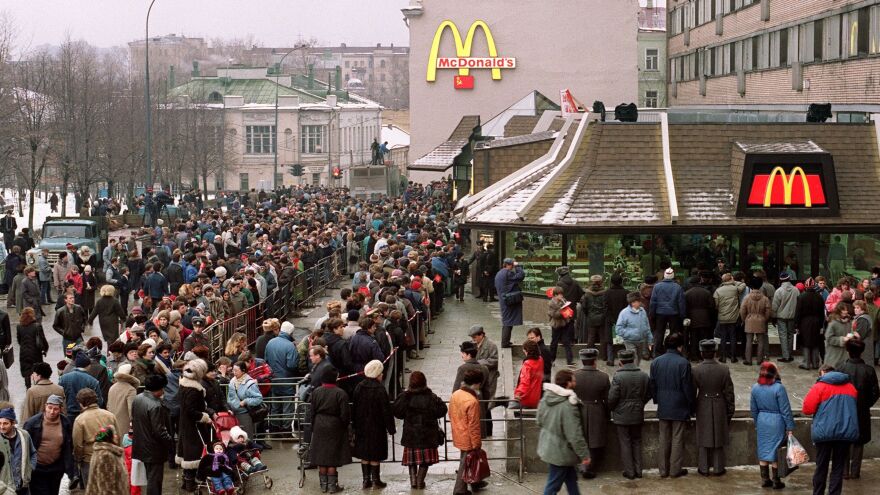
McDonald's is exiting Russia over its invasion of Ukraine, pulling out of a market it's been a part of for 32 years. The fast-food giant had previously paused its operations in Russia less than two weeks into the brutal conflict being waged over Ukraine's future.
McDonald's wants to sell its entire slate of restaurants in the country to a Russian buyer. To prepare for that sale, it will start "de-arching" its restaurants — stripping them of its trademark signs, menus and branding.
The company cites ethics and business reasons
McDonald's emphasized the humanitarian crisis in Ukraine and its corporate values while announcing its move on Monday, but it also described it as a business decision, citing the "unpredictable operating environment" in Russia, which has become an economic pariah due to international sanctions.
"The humanitarian crisis caused by the war in Ukraine, and the precipitating unpredictable operating environment, have led McDonald's to conclude that continued ownership of the business in Russia is no longer tenable, nor is it consistent with McDonald's values," the company said.
Tens of thousands of employees will be affected
The decision will directly affect some 62,000 employees, along with hundreds of suppliers and distributers. While it's looking for a buyer, McDonald's says, it will aim to ensure that all of the employees will continue to be paid. The corporation has been paying their salaries since March 8, when it paused the operations of its restaurants in Russia.
"We have a long history of establishing deep, local roots wherever the Arches shine," Chris Kempczinski, McDonald's president and chief executive officer, said in a news release. He praised the company's employees in Russia — but, he added, "we have a commitment to our global community and must remain steadfast in our values. And our commitment to our values means that we can no longer keep the Arches shining there."
McDonald's arrival helped start a new era in Russia
The hamburger chain's departure will end an era that began in January of 1990, when, after much anticipation and fanfare, McDonald's opened its first store in Moscow's Pushkin Square.
It was seen as a concrete sign of the thawing of the Cold War, of Russia's progress at a time when it was part of the communist Soviet Union, and of the arrival of a new gateway to the West.
That first restaurant's opening was wildly successful, serving more than 30,000 customers who braved massive lines to grab a Big Mac and other sandwiches on that unprecedented first day.
"I felt like I was eating America itself," a customer named Andrey was quoted as saying.
But the U.S. and Russia are now in a new era, one that has seen a number of Western businesses pull out of a country they once entered with great fanfare.
Describing the financial logistics of leaving Russia, McDonald's says it will record a charge of around $1.2 billion to $1.4 billion "to write off its net investment in the market."







